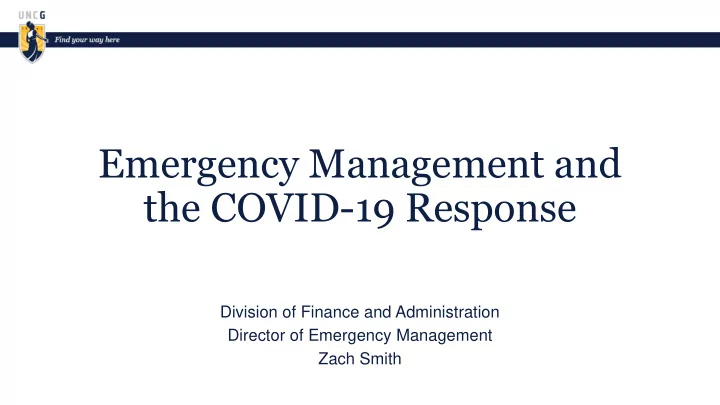

Emergency Management and the COVID-19 Response Division of Finance and Administration Director of Emergency Management Zach Smith
Office of Emergency Management What we do… • University-wide emergency planning Our Mission … • Incident response & support • System-wide mutual aid • Training, exercise, & corrective actions The UNCG Office of Emergency Management strives to provide a • Stakeholder preparedness safe, disaster resilient university • Crisis communications through a comprehensive, all- hazards Emergency Management Where we are headed… Program… • Continue the development of our program and enhance our capabilities • Pursuing EMAP accreditation in 2022
Emergency Management Program EM Program Advisory Committee – Key internal and external stakeholders EMPAC Crisis Policy Group – Chancellor and select executive staff CPG EM Program Emergency Planning and Response Team – EOP representatives EPART Other Ad hoc or specialty committees that may drive the direction of EM components
Emergency Planning
Emergency Operations Plan • Approved January 28, 2020 • Adheres to the National Incident Management System (NIMS) • All-hazards approach to managing emergencies • Uses Emergency Support Functions (ESFs) • 20 departments have responsibilities in the plan • Aligns with System, county, and state plans
Emergency Operations Plan • ESF-1: Transportation • ESF-9: Search and Rescue • ESF-2: Communications & IT • ESF-10: Hazardous Materials • ESF-3: Public Works & Engineering • ESF-11: Natural Resources • ESF-4: Fire Services • ESF-12: Energy • ESF-5: Information and Planning • ESF-13: Law Enforcement • ESF-6: Mass Care & Human Services • ESF-14: Cross-Sector Business • ESF 7: Resource Management • ESF-15: Public Information • ESF-8: Public Health & Medical Services • ESF-16: Research & Lab Support
Crisis Policy Group Emergency Emergency Management and Emergency Planning and Incident/Unified Operations Response Team Command (Emergency Operations Center) External agencies, nongovernmental, private sector, and volunteer organizations
COVID-19 Preparedness and Response Continued Activated Communicable Increased Monitoring Feb 5-29 Disease Committee Preparedness Efforts Jan 23 Jan 28 Increased our monitoring of the The UNC System conducted their Communicable Disease Committee 2019 novel coronavirus as the CDC first COVID-19 conference call. members, EOP departments and issued a Level 3 waring for Wuhan, UNCG conducted their fist the Crisis Policy Group continued to China. International Programs were Communicable Disease Committee prepare by holding meetings, already engaged and closely meeting to discuss the situation and researching best practices, monitoring the situation and began establish action items and key conducting advance planning, pulling lists of students who may be planning considerations. inventorying supplies, training staff, impacted. and conducting tabletop exercises. As the situation started to grow and planning and coordination efforts Jan 27 expended outside of the Feb 5 UNCG activated Veoci, the Communicable Disease Committee, University’s virtual emergency operational leadership transitioned operations center system to allow to Emergency Management. The for increased communication and EOP was activated and depts coordination. began further preparedness efforts. Activated Leadership UNCG Virtual EOC Transitioned to EM
COVID-19 Preparedness and Response UNC System Issues 1 st Activated UNCG Continued Response Mar 17 - Coronavirus Webpage Policy Decision Efforts Mar 11 Mar 3 In response to the increasing The UNC System issued its first UNCG continues to increased amount of questions and request for policy decision to suspended preparedness efforts as new information, University classes for one week to allow information about COVID-19 Communications established a transition to online course work and becomes available and continues to Coronavirus webpage to provide a encouraged residential students to respond to the operational needs of wealth of information specific to leave campus by March 15. the University, to include supporting UNCG students, faculty, and staff. those students still residing on campus. The UNC System issued its second Utilizing the National Incident policy decision to vacate residence Management System’s Incident Mar 17 Mar 5 halls and substantially reduce Command System (ICS), UNCG campus operations. Only mandatory established a response organization staff were to report to campus. structure to delineate UNCG also decided to suspend responsibilities and reporting face to face classes. relationships specific for COVID-19. Established a Response UNC System Issues 2 nd Organization Structure Policy Decision
Moving Forward • Manage a “shelter -at- home” order • Care for on campus residents • Continue communications with stakeholders • Complete this semester and plan for future semesters • Begin recovery planning • Conduct after action process
Questions?
Zachary R. Smith, CEM, MPA Emergency Management Director zrsmith3@uncg.edu emg.uncg.edu
Recommend
More recommend